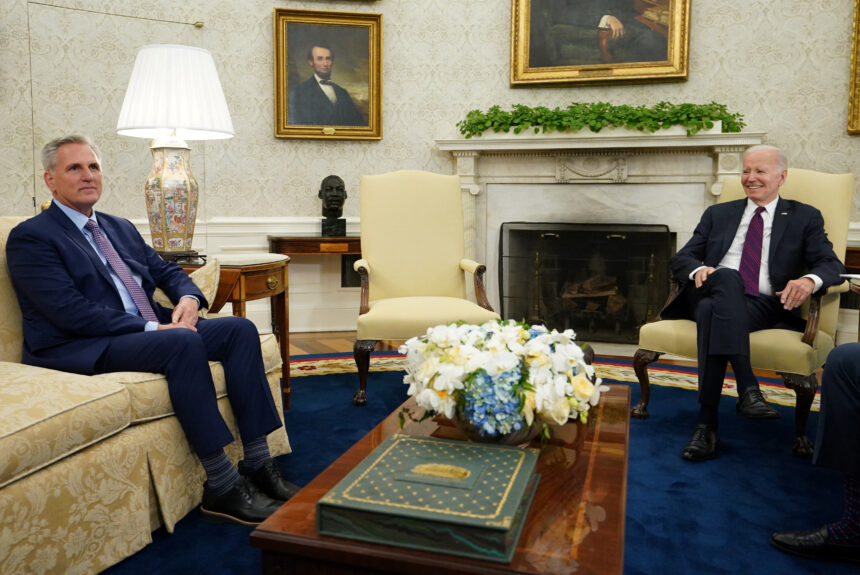President Biden signed legislation this weekend averting what many argue could have been a “catastrophic default” on our nation’s debt. Having worked for the Senator (the late Tom Coburn) who pioneered the modern tactic of using the debt limit to debate whether we should reconsider the spending levels that precipitate the need to raise the nation’s borrowing limit (how radical) I wanted to reflect on some of the best and worst takes on the debt limit fight.
First, the worst hot takes.
Rep. Jamaal Bowman (D-NY) told CNN, “I called on the president to invoke the 14th Amendment and mint a coin and do not negotiate with hostage takers. I mean, we don’t negotiate with terrorists globally. Why are we gonna negotiate with the economic terrorists here that are the Republican Party?”
In his duplicitous Oval Office address this weekend, President Biden rebuked this sentiment. (Aside: calling your opponents “terrorists” or “Nazis” is a sign you’re losing the policy argument).
>>>READ: Debt Ceiling Permitting Provisions Offer Good First Step to Meaningful Reform
Biden said, “My fellow Americans, when I ran for President, I was told the days of bipartisanship were over and that Democrats and Republicans could no longer work together. But I refused to believe that, because America can never give into that way of thinking.”
Yet, a few months earlier Biden defended “that way of thinking” when he said he would not negotiate over the debt limit. Biden maintained that irrational and extreme position for months. Thankfully, Joe changed his mind and is now hoping voters will allow him to take some credit for the deal he long resisted.
Another dumb hot take came from former Trump adviser Steve Bannon who said, “McCarthy’s got to go. There’s just no doubt … That team of Graves, McHenry, and McCarthy, they can’t negotiate. They negotiated a surrender … You can’t do that. You got to fight. You can’t negotiate a surrender.”
Unlike Bannon, I’ve participated in successful debt limit negotiations. McCarthy did a very good job with the hand he was dealt and continues to defy critics. The starting point with any debt limit negotiation is the status quo. Any concessions, reforms, or spending constraints is a win. Period. And Bannon and other “con”servative chest thumpers didn’t detail any deal that could have received 60 votes in the Senate. The good news for Republicans is that they rallied around a coherent and reality-based “Stop the Steal” effort regarding taxpayer funds rather than a fake effort to “Stop the Steal” of an election Trump lost due to his mistakes.
Let’s look at a few smart takes.
First, former Trump White House Chief of Staff and Office of Management and Budget Director Mick Mulvaney said McCarthy negotiated a much better budget deal than Trump. He’s right. As Mulvaney wrote in The Hill about Trump’s 2017 deal, it “had precisely zero spending reductions. It was so awful that 90 House Republicans voted against it.”
Mulvaney called McCarthy’s agreement a minor miracle. That’s fair and true praise. A major miracle happened back in 2011 when fiscal conservatives used the debt limit fight to force then-President Barack Obama to pass the Budget Control Act. The dreaded sequestration process caused the river of government spending to run backward when spending declined for the first time since the Korean War.
Meanwhile, Phil Rossetti at R Street offered a must-read and measured take on what was accomplished in terms of permitting reform, and what still needs to be accomplished. Had McCarthy not negotiated and followed Bannon’s dumb advice to engage in exhibitionist self-immolation (lighting oneself on fire) to demonstrate one’s nihilistic devotion to “fighting” and “not surrendering” zero progress would have been made.
>>>READ: House Republicans Wisely Bet Their Future on a Climate and Energy Agenda
Of course, the deal hardly solves our long-term fiscal challenges and doesn’t address the real long-term drivers of our debt like entitlement spending. In many respects the deal is like Congress eating two donuts a day instead of three. It’s one less donut (hooray!) but two too many. At The Dispatch, Brian Riedl correctly argues that the deal is “loaded with gimmicks but still worth it.”
Still, the deal shows that principled pluralism and principled compromise may be making a comeback. Alexander Hamilton wrote a smart take in Federalist 65: “If mankind were to resolve to agree in no institution of government, until every part of it had been adjusted to the most exact standard of perfection, society would soon become a general scene of anarchy, and the world a desert.”
A significant majority of members in both chambers sided with Hamilton’s view of representative government and rejected the performative and rhetorical one-upsmanship of Bowman and Bannon.
Anyone looking for perfection in politics is going to be disappointed and that’s especially true of debt limit negotiations. Even though members like Coburn in 2011 and McCarthy in 2023 used the debt limit to extract wins for taxpayers, there’s a sensible case to be made that doing away with debt limits is a good idea. Shifting the political gravity and consequence to original spending decisions that create debt, erode growth and undermine our national security might put more downward pressure on spending.
Regardless, while the deal is a marginal win for taxpayers, it’s a big win for reality-based “Stop the Steal” of our tax dollars fiscal conservatives who want the argument in Washington to be about spending levels and the relationship between the individual and state. Whether you think our greatest challenges come from climate change or China (or both), helping Washington live within its means is the best way to spur innovation and growth and help our nation build the strength necessary to meet any threat.
The views and opinions expressed are those of the author’s and do not necessarily reflect the official policy or position of C3.
